MercoPress. South Atlantic News Agency
Tag: exchange rate
-
Saturday, January 3rd 2026 - 08:48 UTC
Argentina shifts exchange rate policy

The Argentine exchange market entered a new era on Friday, following the partial removal of credit card surcharges on expenditures in foreign currency. Additionally, the parity with the local peso now hinges on an inflation-linked floating scheme.
-
Tuesday, November 16th 2021 - 09:45 UTC
US dollar does not soar as expected following Argentina's elections results
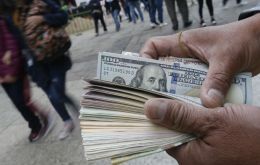
Contrary to expectations, the unofficial exchange rate between the Argentine peso and the US dollar remained somewhat stable Monday following the ruling party's overall loss at Sunday's mid-term elections.
-
Friday, November 5th 2021 - 09:29 UTC
Argentine Central Bank takes action to keep exchange rate under control
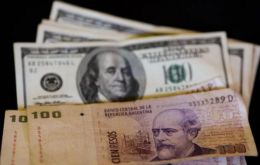
Argentina's Central Bank (BCRA) Thursday ordered banking institutions nationwide not to increase their holdings in foreign currency until the end of the month, amid a market pressure on the exchange rate.
-
Friday, June 8th 2018 - 08:35 UTC
Temer denies any risk of a currency crisis; Central bank pledges “all the necessary liquidity”
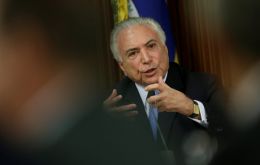
Brazilian President Michel Temer said on Thursday there was no risk of a currency crisis in Latin America's largest economy despite sharp falls in the exchange rate, while the central bank chief pledged to maintain the bank's intervention in the market.
-
Thursday, May 17th 2018 - 09:10 UTC
The dollar falls in Argentina while in Uruguay the rise “does not worry”
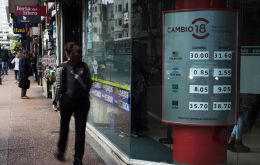
The recent rise of the dollar in Argentina had some impact in Uruguay, where it has an accumulation of 7.4% in May. However, for the president of the Central Bank of Uruguay, Mario Bergara, the escalation only owes 20% to the exchange rate in Argentina and rather considers that Uruguay is accompanying global trends.
-
Monday, May 7th 2018 - 08:29 UTC
Argentina and China among the most vulnerable markets, says IIF

The markets of China, Ukraine, Argentina, South Africa and Turkey are the most vulnerable among all developing countries in terms of financing needs, reserve adequacy, asset valuation, institutional quality and trade resilience, according to a review by the analysts of the Institute of International Finance (IIF).
-
Wednesday, December 28th 2011 - 03:25 UTC
US calls for appreciation of the Yuan but falls short of labelling China a currency manipulator
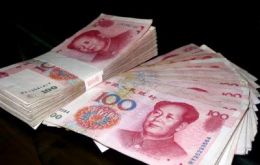
United States announced it will press for further appreciation of the Yuan arguing the currency is undervalued, while declining to brand China a manipulator of its exchange rate.
-
Tuesday, May 10th 2011 - 21:27 UTC
Beijing promises a more flexible Yuan exchange rate, says US Treasury
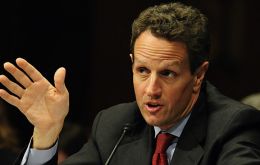
China assured the United States that it will continue moving toward a more flexible Yuan exchange rate, a US Treasury official said on Tuesday. The announcement came as the Central bank set the Yuan reference rate at the strongest level since 2005.
